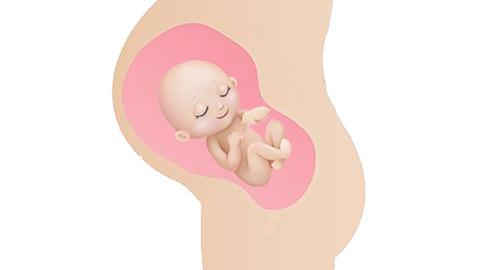You’re now 6 months or 24 weeks pregnant and your developing baby is showing just how strong their muscles have become by kicking and moving actively in the womb. Find out what foods fuel your developing baby’s motor skills and help support their overall growth and development.

Common Symptoms When You’re 24 Weeks Pregnant
Now that you’re 24 weeks pregnant and well into the second trimester, you can expect lighter, less severe pregnancy symptoms. However, you’re still likely to experience some discomfort1:
-
Stretch marks and itchy skin will continue as your belly grows, so make sure to keep your skin hydrated with a gentle moisturizer.
-
As your belly -- and the baby inside -- grows, backaches may become increasingly common. Try to maintain good posture to alleviate pains and use a pillow to support your lower back.
-
Difficulty sleeping is another common pregnancy symptom, and is usually caused by back aches, nausea and your growing belly. This symptom is usually experienced during the second trimester and could last throughout the third trimester. In that regard, you can opt to improve your sleeping position, which in turn, could help to alleviate your sleeping problems. Do this by sleeping on your side, in a foetal position, with a pillow in between your legs. Sleeping on your left side, in particular, can improve circulation and prevent the application of pressure on the liver by your uterus. You can also support your abdominal area by placing a pillow under your stomach. Constipation will continue to be a problem throughout your pregnancy. Make sure to eat fibre-rich foods and drink plenty of water.
-
Your breasts may also start producing small amounts of early milk called colostrum. This, together with Braxton-Hicks contractions -- mild, irregular contractions known as “false labour” -- is the body’s way of preparing for your eventual delivery.
-
You may also notice the development of varicose veins during pregnancy. But do not fear, for varicose veins are a common and usually harmless occurrence, and usually happens when the uterus applies pressure to the large vein - the inferior vena cava - that carries blood back to the heart from your feet and legs.
-
You will also experience swollen feet and ankles during pregnancy. This is completely normal, and is typically caused by your body’s need to produce increased amounts of blood and fluid to support the growing baby, your placenta, as well as other bodily changes that occur during pregnancy.
-
At the same time, swollen feet and ankles can also be caused by your growing baby and uterus which can put pressure on your circulatory and lymphatic systems2. Pregnancy swelling can also be caused by prolonged standing, hot weather, excessive sodium consumption, low levels of potassium in the body and heavy caffeine intake2. That being said it is important to note that a swelling of the feet and ankles can be tell-tale of other pregnancy-related problems, which include preeclampsia, blood clots, a skin infection, or problems affecting the heart or lungs.
Your Developing Baby’s Physical and Mental Gym Work
You’ll definitely feel plenty of movements in your womb when you’re 24 weeks pregnant, as your developing baby tries tumbling, kicking and rolling to practice their motor skills. Your developing baby is making their presence felt, but that’s also because of their increased size in your womb.
Your developing baby now weighs around three pounds (1.3 kilograms) and has grown to between 11 and 16 inches (28 to 40 centimeters) long. You also probably noticed your developing baby's sleeping habits don't necessarily match your own! Don't worry, their energetic movements will become less frequent towards the end of your pregnancy as they have less room to move.
All this gym work will pay off in the future as your developing baby is practicing the movements that will help them eat, drink and breathe. Your baby’s brain, which continues to develop, is also helping them to learn these skills.
While your developing baby is hard at work practicing their motor skills, you can help to support their progress when you’re 6 months pregnant by eating well and nourishing yourself and your developing baby.
Food to Help Your Baby Develop Their Brain and Body
There is so much physical activity and mental development happening when you’re 24 weeks pregnant. And this makes it a good time to re-evaluate what you eat. You’ll want to get all your nutritional requirements. At the same time, you’ll also want to give your developing baby all the nutrients they need.
DHA
To achieve a well-balanced diet, you need DHA, an omega-3 fatty acid which is essential for your baby’s brain and eyes to develop. In fact, DHA represents about 97% of all omega-3 fats in the brain and 93% of all omega-3 fats in the eye’s retina.
Protein
You’ll also need to increase the amount of protein you consume in the second and third trimester of your pregnancy from about 45 grams per day to 70 grams per day3. And that means including more chicken, fish, rice and eggs in your meals. The amino acids in protein are the building blocks for your developing baby’s cells as well as your own body2.
To meet these requirements, you can eat a variety of food that is rich in protein. An egg has about 6 grams of protein; one cup of skimmed milk has 8 grams; half a cup of raw tofu has 20 grams; and half a roasted chicken breast has around 27 grams. So you should have no trouble getting the required amount.
Water
It’s also important to drink plenty of water when you’re 24 weeks pregnant -- as well as throughout your pregnancy. Water helps carry nutrients to your cells, takes away waste and prevents you from getting dehydrated and fatigued. Pregnant women are advised to consume at least 10 glasses of water per day4.
Calcium
Help your developing baby grow strong bones and teeth by getting enough calcium every day. The following foods are all good sources of calcium:
-
beancurd
-
soft tofu set with calcium salt
-
soy milk fortified with calcium
-
dried shrimp
-
sesame paste
-
cooked eggs
-
vegetables like choy sum, kale, bok choi, mustard greens, and broccoli5

Your Developing Baby’s Early Preparation
When you’re 6 months pregnant, between weeks 23 to 26, your developing baby’s lungs produce a fatty substance called surfactant. This will help their lungs expand more easily when, in three months’ time, they have to breathe on their own.
Next month, your developing baby will start to develop a new sense. Read on to find out how their sense of smell develops at the start of your third trimester in Pregnancy Stages: Month 7.
Almost all parents talk to their unborn child. And last month was when he began to hear you for the first time. You can track how far you and your developing baby have come in Pregnancy Stages: Month 5.
Want to learn more about how your developing baby will develop over your pregnancy – plus, nutritional advice for you and your developing baby, online support and more? Sign up for Enfamama A+ Club to receive new articles, useful tips and rewards that can help you and your developing baby!
Expert Resource:
Dr. Raymond Choy Wai Mun
(MCR 18097A)
MBChB (UK), Aviation Medicine (Singapore)
REFERENCES:
- 24 Weeks Pregnant: Symptoms, Tips, and More https://www.healthline.com/health/pregnancy/24-weeks-pregnant#your-body. Accessed November 2020
- 10 Steps to Better Pregnancy Sleep, https://www.enfagrow.com.sg/my-pregnancy/development/tips/10-steps-better-pregnancy-sleep , Accessed February 19, 2021
- Why Do Some Pregnant Women Get Varicose Veins?, https://kidshealth.org/en/parents/veins.html , Accessed February 19, 2021
- Swelling in pregnancy—when it’s normal and when it’s not, https://www.mother.ly/life/swelling-in-pregnancy-when-to-worry , Accessed 19 February 2021
- Protein in your pregnancy diet, http://www.babycenter.com/0_protein-in-your-pregnancy-diet_1690.bc, Accessed October 2015
- Water: How much should you drink every day?, http://www.mayoclinic.org/healthy-lifestyle/nutrition-and-healthy-eating...., Accessed October 2015
- Healthy Eating During Pregnancy and Breastfeeding, http://www.fhs.gov.hk/english/health_info/woman/20036.html#1, Accessed October 2015









